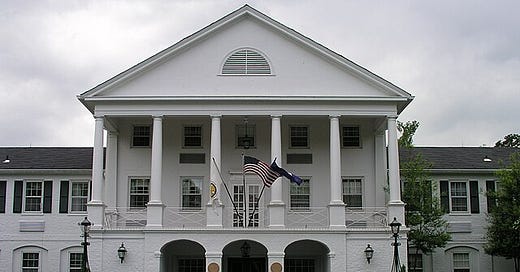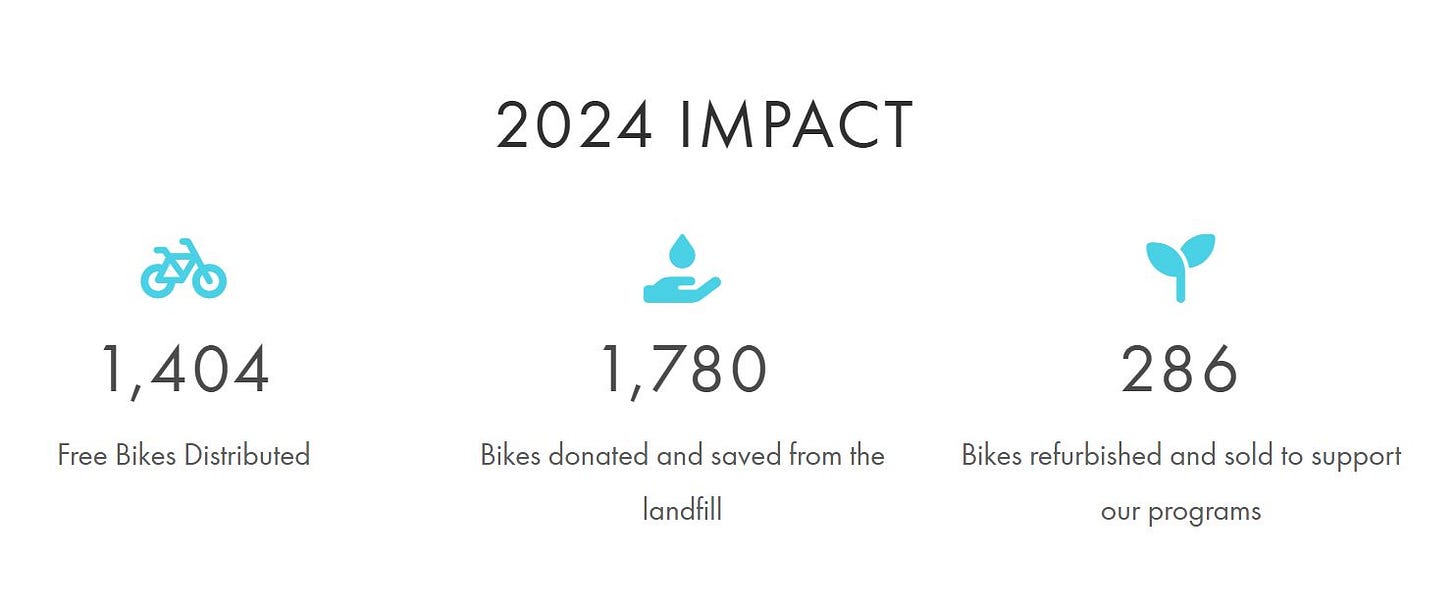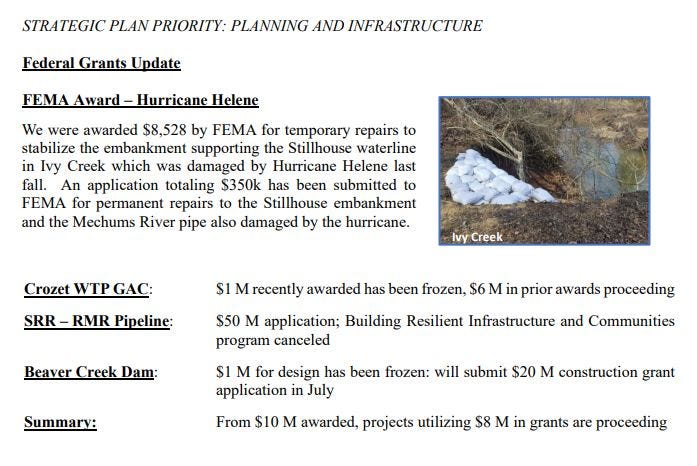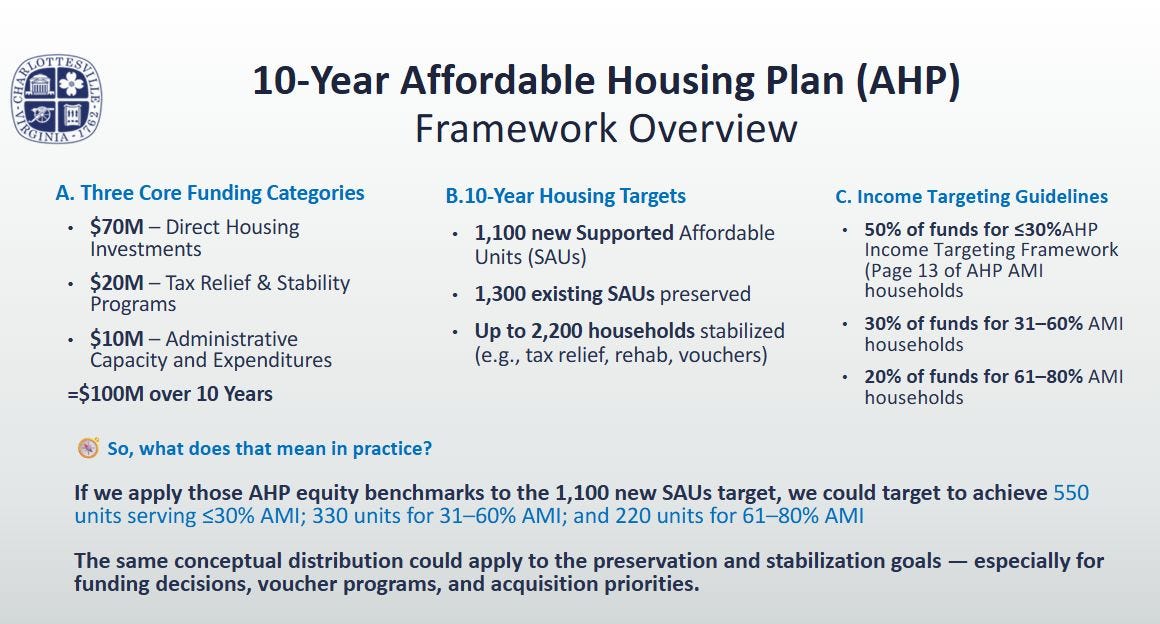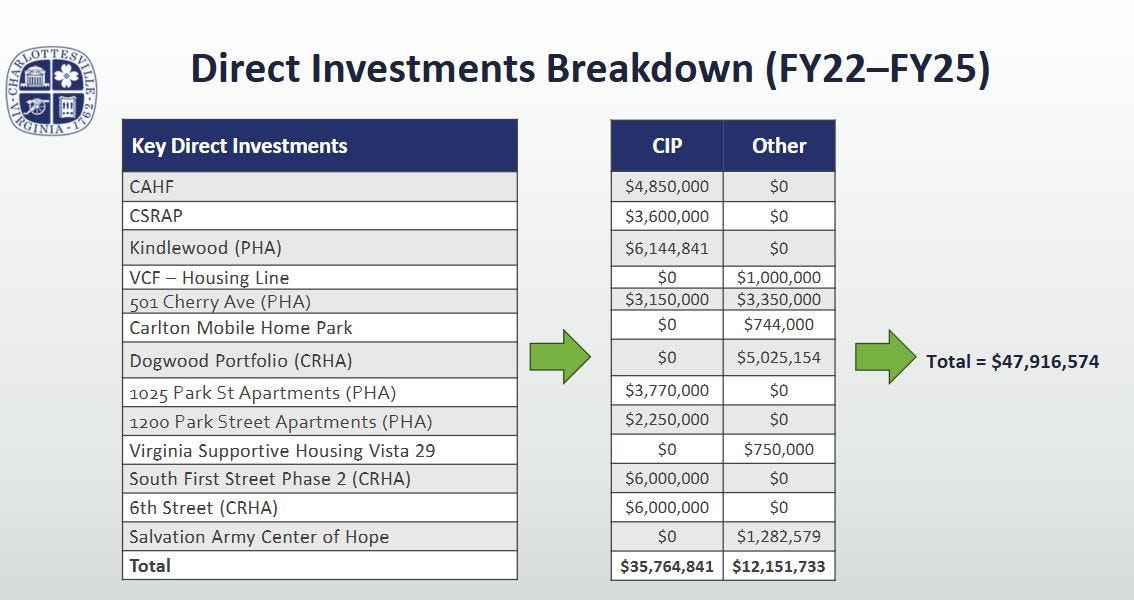April 23, 2025: Charlottesville City Schools submit application to acquire Federal Executive Institute for preschool education site
Plus: Charlottesville City Council gets a briefing on affordable housing investments
Twenty years ago today, the first video was posted to YouTube, ushering in a new age of communication. One of the co-founders posted a 19-second video of himself going to a zoo. We’re now a fifth of a century later and there is a seemingly endless collection of items that you can watch. This April 23, 2025 edition of Charlottesville Community Engagement is not one of them. I’m Sean Tubbs and I’m wondering: Will any of it still exist in 7,305 days?
In today’s installment:
Charlottesville City Schools have put in an application with the federal government to acquire the now-closed Federal Executive Institute
The head of the Rivanna Water and Sewer Agency briefs his board on retention of $9 million of $10 million in recently awarded federal grants
Charlottesville City Council is briefed on the results of direct investment in affordable housing projects
First shout-out: Charlottesville Community Bikes
In today’s first subscriber supported shout-out, Charlottesville Community Bikes strives to provide wheels to anyone who needs a ride. That includes:
There’s a Kid’s Bike program for people under the age of 12 (learn more)
Several social services organizations refer people to Charlottesville Community Bikes for access to reliable transportation (learn more)
Keep an eye on their calendar for the next mobile repair clinic (learn more)
There’s also a workforce development program that “blends mentorship and comprehensive training in bicycle mechanics” (learn more)
Visit the Charlottesville Community Bikes website today to learn more!
Charlottesville City Schools to seek acquisition of the Federal Executive Institute
A signature theme of the 47th President of the United States is an attempt to dismantle the existing structure of the federal government.
“Bureaucratic leadership over the past half-century has enlarged and entrenched Washington, D.C.’s managerial class, a bloated system far removed from the needs of American families,” reads an executive order signed by Donald Trump on February 10 ordering the closure of the Federal Executive Institute.
The Federal Executive Institute was created to train a workforce to run the country’s national government. All training ended on February 28. The website used to have this description.
“Built upon foundational public service values and competencies, our programs support federal leaders in understanding their role within the government’s constitutional framework. By encouraging introspection through small group work, participants build learning communities, where everyone is both a teacher and learner.”
The United States of America purchased a 14 acre tract at 1301 Emmet Street in 1982 for just under $2 million. The property is now assessed at just over $19.5 million but today Charlottesville City Schools announced they have applied to acquire the site through the Federal Real Property Assistance Program.
“If the division’s application is accepted, CCS would have the opportunity to acquire the property at a reduced or no cost through the Public Benefit Allowance discount for educational purposes,” reads an information release sent out at 10:45 a.m. this morning.
If successful, the site might replace Walker Upper Elementary as the location for a long-desired pre-school program.
The release states a preliminary plan would be to use already allocated funds to pay for interior renovations. That would free up the Walker site to be used for other purposes such as a new home for the alternate middle school and high school.
“This single opportunity offers a cost-effective way to impact young people in Charlottesville from age 3 through graduation,” the release quotes Superintendent Dr. Royal Gurley. “From our preschool to a family welcome center to alternative learning programs, this acquisition would allow us to make powerful changes on an accelerated timeline.”
More details are in the application itself.
“The campus where we had planned to create the centralized preschool can become the home of our middle and high school alternative learning programs, eliminating student wait lists and enabling those students to easily access programs and activities at our nearby high school,” reads a narrative in the application. “In turn, space freed up by the current alternative program adjacent to Trailblazer Elementary becomes available for programming to support our younger students with special needs.”
The announcement comes a week after Charlottesville City Council adopted a budget for FY2026. Around $30 million has already been allocated for preschool consolidation according to CCS Community Relations Coordinator Amanda Korman.
The application includes a line that states CCS might partner with other groups to provide new uses for some of the FEI site.
“Dorm furnishings not needed for school use could be donated to UVA or local non-profit housing partners,” reads the application.
The release states that there is no timeline for when the federal government might make a decision but if the application is accepted the next step will be a more thorough evaluation of the property.
RWSA reports agency still on track to receive $9 million of $10 million in federal grants
The executive branch under President Donald Trump has upended a system where the federal government helps contribute to infrastructure projects across the United States.
The Board of Directors of the Rivanna Water and Sewer Authority learned on April 22 that the organization will have to find other funding for some projects.
“We've celebrated that we had 10 million in grants awarded,” said Bill Mawyer, the RWSA’s executive director. “We haven't gotten all those dollars yet.”
Mawyer did say that the Federal Emergency Management Agency recently announced RWSA will receive $8,500 to help cover the cost of temporary repairs to shore up an embankment at Stillhouse Mountain damaged during Hurricane Helene. The agency has applied for $350,000 in funds for a permanent solution there as well as to fix a pipeline that crosses the Mechums River.
A $1 million federal grant would have gone to cover part of the cost of installing a water filtration project in Crozet. The project would have upgraded the granular activated carbon system and had been funded through the Virginia Department of Health’s Emerging Contaminants that itself had been funded through the Bipartisan Infrastructure Law. The project is proceeding anyway.
“So out of the $7.2 million that we had been awarded, we still have $6.2 million,” Mawyer said. “So we're moving forward with that project and expect to get it out to bid as soon as VDH finishes its review of our design plans.”
The RWSA had applied for $50 million through the Building Resilient Infrastructure and Communities program to help cover the cost of the planned waterline between the Ragged Mountain and South Fork Rivanna reservoirs. That entire program was canceled which means ratepayers will contribute more of the cost of the $117 million project. Construction is scheduled to begin in ten months.
Mawyer did have good news about one project.
“Yesterday we were notified that on the Beaver Creek dam project that $1 million that had been frozen was now unfrozen,” Mawyer said. “I think the court said they had to unfreeze those dollars. And so we are back. That’s the design funding on Beaver Creek and we plan to submit a $20 million grant application in July for that.”
Mawyer also provided an update on legislation that passed the General Assembly.
HB2749 and SB1408 will require waterworks to report anomalies or incidents of negligence to the Virginia Department of Health within two hours. This legislation was introduced after waterworks in the City of Richmond had a catastrophic failure earlier this year. The legislation had said six hours, and Governor Youngkin amended it to two hours.
The RWSA reviews development proposals in Albemarle and Charlottesville and HB2660 will require them to complete those reviews much faster.
Two bills related to microplastics in water failed. HB1618 would have required the Commissioner of Health to study their presence in public drinking water, but was left in the House Rules Committee.
SB1319 would have required the Department of Environment Quality to monitor discharges of industrial wastewater for per- and polyfluoroalkyl substances (PFAS). This passed the Senate unanimously and the House on a 69 to 27 vote. In his veto statement, Youngkin said the legislation was not necessary and premature because a monitoring framework set up in the 2024 General Assembly was still getting up to speed.
Mawyer also reported on the inaugural meeting of the Middle James #1 Regional Planning Unit. Recent legislation requires the Department of Environmental Quality to create regional water supply plans to be created.
“We are with Albemarle, Buckingham, Fluvanna, Greene and Louisa and Charlottesville and other towns and authorities in our area,” Mawyer said. “I think the Thomas Jefferson Planning District Commission is going to facilitate and run that committee to help put the plan together.”
The next committee meeting will be in May.
Second shout out: Charlottesville E-bike Lending Library
The rolling topography of the Charlottesville area keeps some people away from choosing cycling as an option to get around. Perhaps an e-bike is in order?
That’s where Charlottesville’s eBike Lending Library comes in! E-bikes are a great way to get around the community but there are many brands and styles to choose from. Because many e-bikes are sold online, it can be a challenge to try an e-bike before buying one.
The Charlottesville E-bike Lending Library is a free, not-for-profit service working to expand access to e-bikes in the area. They have a small collection of e-bikes that they lend out to community members for up to a week, for free. You can experience your daily commute, go grocery shopping, or even bike your kids to school, and decide whether e-bikes are right for you. Check out this service at https://www.ebikelibrarycville.org!
Charlottesville City Council briefed on current state of affordable housing
Nearly fifty months have passed since Charlottesville City Council adopted a plan that set out several ways in which the city could increase the number of housing units whose monthly rent or sales price is within reach of people with incomes below the area median.
A major pillar in the Affordable Housing Plan is for Council to commit to spending more money each year toward that purpose.
“Through FY22 to FY25, what we've been working towards is significant and meaningful funding commitments towards the $100 million commitment over 10 years,” said Antoine Williams. “With that, we're targeting about 1,100 new supported affordable units.”
Williams said the city is also seeking to maintain about 1,300 units that are currently supported and to assist another 2,200 households through tax relief, housing vouchers, and direct payments for rehabilitation.
Of that $100 million, Williams said $70 million is in direct investment in construction of housing. $20 million will come through tax relief and stability programs. Another $10 million will go to administrative efforts.
A total of $58.77 million has been tallied for FY22 through FY25. So that has included about $48 million in direct investment in projects both from the Capital Improvement Program and other funds. That has resulted in 983 new units being added to the development pipeline. Williams said that breaks down as follows:
348 units are being built to households making less than 30 percent of the area median income. That’s about 35 percent of the total. However, the suggested target in the Affordable Housing Plan is for 50 percent of supported units to be reserved for those with very low incomes.
Another 427 units are going toward households making between 31 percent and 60 percent of the area median income. That’s 43 percent and the target is 30 percent for this category.
The 208 remaining units are being suggested for households between 61 percent and 80 percent of the area median income. That’s right at the target of 20 percent.
Williams said if trends continue, the city is on track to exceed the $100 million goal by about $20 million. That factors in the $15 million City Council has agreed to spend on the redevelopment of Westhaven.
City Councilor Michael Payne said Charlottesville is in the middle of a success story as a locality with one of the highest amounts of spending on affordable housing per capita on the east coast. He acknowledged it is expensive to build below-market units.
“You're talking about a product that the market is just never going to produce because it's losing money every month,” Payne said. “And it's an area where it has to be stepped in from local, state and federal government to invest in it as a public good. And most localities don't do that because it's extremely expensive as we see in this report. There's no avoiding that. It costs a lot of public money.”
Payne supported efforts to increase spending about $10 million a year for Charlottesville to meet its goals. He also said he does not want money paid by developers to buy out their affordability requirements to be added as part of that calculation. The developer of the Verve will contribute $6.8 million and the developer of 2119 Ivy Road is contributing $3.25 million. (read that story)
Councilor Lloyd Snook disagreed with at matter given both the financial uncertainty as well as other requests in the community such as IMPACT’s demand that the city increase the number of Charlottesville Area Transit drivers to 82.
“We are also being asked to make commitments to purchase a whole bunch more buses, to hire a bunch more people to drive those buses,” Snook said. “ We are also being asked to make a number of other commitments.”
Snook said no sitting Council has the power to bind decisions to be made by a future of another Council.
The new Development Code adopted by Charlottesville in December 2023 includes a provision to require affordability in structures larger than nine residential units. Anything over ten units requires ten percent of units to be provided to households below 60 percent of the area median income. City Manager Sam Sanders said the city government will need to pay someone to track that information.
“As development happens, there will be a need for additional staff to work to maintain the compliance measures and even the tracking,” Sanders said. “We have not gone as far out in trying to anticipate any of that yet because we're looking for the deals to come in.”
The 2021 Affordable Housing Plan is based on data from 2019 which means more information is required before the city can know how many are living outside of their means. The Thomas Jefferson Planning District Commission is currently taking the lead on conducting a new assessment of the region’s housing needs including the City of Charlottesville.
Reading material:
Charlottesville electronics business joins lawsuit against tariffs, Kate Neuchterlein, WVIR 29News, April 17, 2025
Charlottesville could exceed its 10-year commitment to affordable housing, Erin O’Hare, Charlottesville Tomorrow, April 22, 2025
ICE detains 2 men in Charlottesville courthouse raid, Hawes Spencer, Charlottesville Daily Progress (paywall), April 22, 2025
Wherefore art thou, #853?
I thought about skipping today because I can only explain my brain right now as being addled by spring fever. The warm nights have me out socializing later, something I don’t think I’ve really done in a decade or so. Spring always depresses me until the leaves are fully out on the trees and something shifts and I don’t want to work as hard.
Yet, I want to bring people information! And though I know other information outlets will have two out of these three stories today, I know there are people who have come to rely on these missives. So, out they go!
But it’s 4:30 p.m. so I’m cutting this short. I want to go hang out with some friends.

